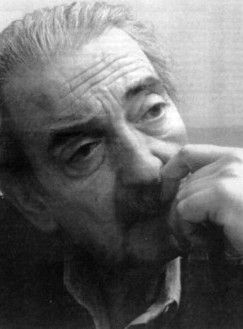Homage to Juan Gelman
 The L.A. Review of Books just published a superb homage to recently deceased poet Juan Gelman by Víctor Rodríguez Núñez &Katherine M. Hedeen. Opening paras below — for the whole essay, click here.
The L.A. Review of Books just published a superb homage to recently deceased poet Juan Gelman by Víctor Rodríguez Núñez &Katherine M. Hedeen. Opening paras below — for the whole essay, click here.
Juan Gelman or “about a truth that didn’t believe in death.”
The Spanish language edition of this article is available immediately below the English. We also present selections of Juan Gelman’s poetry below, in both Spanish and English, translated courtesy of Katherine M. Hedeen and Víctor Rodríguez Núñez.
WHEN WE LAST SAW Juan Gelman, on the morning of January 12, just 48 hours before his passing, it didn’t seem like death was near. He was noticeably frail, but he also enthusiastically rang a tiny bell to call his nurse. He spoke in whispers, but with precision and clarity. In his wheelchair, a poncho covering his shoulders, a blanket covering his legs, he was dignity personified. He gave us a solemn report on his health: the relentless anemia, the beginnings of lung cancer. He explained his decision to hold out from home, to not go through with chemotherapy. He was well aware of everything, including our translation projects. The conversation never once slipped through his fingers, and as always, his great wit was present. He even spoke of Cervantes, one of the captivity narratives, where he’d found some excellent verses. He offered us coffee, served in lovely china cups, and we gladly accepted. The Mexico City winter light filtered through every cranny of his apartment in Colonia Condesa. We were sure of his determination to fight for his life.
Juan Gelman is the most read, most influential Spanish-language poet of our times. With 30 books published, he is the winner of the Cervantes Prize (2007), the top literary honor in Spanish-language literature. He worked as a journalist and translator, spent many years exiled in Europe and Latin America, and remained an ardent critic of Argentina’s military dictatorship throughout his life. He was above all faithful to poetry as a transformative act — as the quest for a more humane society, and a way to broaden our understanding of the world through universal dialogue. The Argentine novelist Julio Cortázar said that Gelman’s work must be read “by remaining open, allowing meaning to enter other doorways than those of syntactical structure,” for “only in this way can the reader discover the reality of the poems, which is none other than the exact and literal reality of the horror and death, but also the hope, that define Argentina.” (Gelman, Unthinkable4). His death marks not just the end of an era in poetry written in Spanish, but also the passing of a man who never forgot he was part of a family of Jewish immigrants from the Ukraine — an Argentine underdog until the very end.
[ctd. here]
¤

 Poasis II: Selected Poems 2000-2024
Poasis II: Selected Poems 2000-2024 “Todesguge/Deathfugue”
“Todesguge/Deathfugue” “Interglacial Narrows (Poems 1915-2021)”
“Interglacial Narrows (Poems 1915-2021)” “Always the Many, Never the One: Conversations In-between, with Florent Toniello”
“Always the Many, Never the One: Conversations In-between, with Florent Toniello” “Conversations in the Pyrenees”
“Conversations in the Pyrenees” “A Voice Full of Cities: The Collected Essays of Robert Kelly.” Edited by Pierre Joris & Peter Cockelbergh
“A Voice Full of Cities: The Collected Essays of Robert Kelly.” Edited by Pierre Joris & Peter Cockelbergh “An American Suite” (Poems) —Inpatient Press
“An American Suite” (Poems) —Inpatient Press “Arabia (not so) Deserta” : Essays on Maghrebi & Mashreqi Writing & Culture
“Arabia (not so) Deserta” : Essays on Maghrebi & Mashreqi Writing & Culture “Barzakh” (Poems 2000-2012)
“Barzakh” (Poems 2000-2012) “Fox-trails, -tales & -trots”
“Fox-trails, -tales & -trots” “The Agony of I.B.” — A play. Editions PHI & TNL 2016
“The Agony of I.B.” — A play. Editions PHI & TNL 2016 “The Book of U / Le livre des cormorans”
“The Book of U / Le livre des cormorans” “Memory Rose Into Threshold Speech: The Collected Earlier Poetry of Paul Celan”
“Memory Rose Into Threshold Speech: The Collected Earlier Poetry of Paul Celan” “Paul Celan, Microliths They Are, Little Stones”
“Paul Celan, Microliths They Are, Little Stones” “Paul Celan: Breathturn into Timestead-The Collected Later Poetry.” Translated & with commentary by Pierre Joris. Farrar, Straus & Giroux
“Paul Celan: Breathturn into Timestead-The Collected Later Poetry.” Translated & with commentary by Pierre Joris. Farrar, Straus & Giroux
Thank you for this homage. I came to Gelman late but what a magnificent encounter it has been for me.